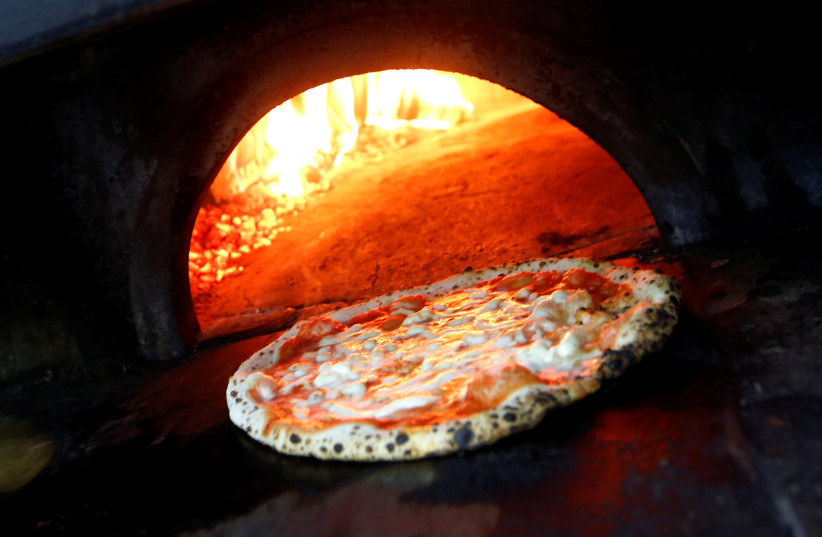February 9 marks National Pizza Day, a day to celebrate that world-famous Italian dish that has become one of the most iconic meals there is.
But maybe "Italian" isn't the right word to describe it.
Indeed, the history of pizza is surprisingly rich and goes back much farther than the introduction of tomatoes to Europe. And, in fact, it may just have an origin that may surprise you: The Jews.
Who invented pizza?
The key ingredient in pizza is not the cheese or tomato, though they are important and essential to the dish in its modern form, but the bread it is all baked on.
Baked bread itself has a very long history. Archaeologists have found evidence that it was made in Sardinia over 7,000 years ago, but other flattened bread dishes exist throughout the world, such as in China, India, Finland and South Asia.
To this day, many flatbread dishes like focaccia, naan, pita, bing and paratha can be found all over the world.
Ancient references also indicate that people would put ingredients on top of bread. The ancient Persians of the Achmedian Empire would have cheese and dates baked on top of flatbreads, and something similar was done in ancient Greece. A dish like pizza was even described in the Aeneid.
But there are several scholars that point to the Jews as the true origin of the modern idea of pizza.
Are Jews responsible for modern pizza?
One of the most interesting theories was brought forth in 1983 by Italian-Israeli Prof. Sandra Debenedetti Stow.
In an article, she cited a 14th-century Italian Hebrew scholar Yehuda Romano who had used a Hebrew spelling of pizza to translate the word hararah, which is a type of flatbread, when translating the work of Maimonides.
Others pointed out that this can't be the case, since the word pizza has been around since the 10th century in a Latin code in Gaeta.
But other evidence still exists, such as the existence of a pizzarelle, a cookie-sized version of pizza eagerly consumed by Jewish children in ancient Rome.
Others, like Abba Eban, the famous Israeli politician and diplomat, had cited the tradition that Roman soldiers added cheese and olive oil to matzah, the unleavened flatbread Jews eat on Passover.
But regardless of these specifics, one thing is clear: Jews are, at the very least, partially responsible for modern pizza.
This is entirely due to the other ingredient involved that truly makes pizza what it is: The tomato.
Tomatoes are not native to Europe and were brought from the New World in the early modern era.
But tomatoes were not trusted by many Europeans. This is because they were widely believed to be poisonous.
The fear was not entirely without merit. Tomatoes are technically part of the Solanaceae family of flowers, also known as nightshades. Many nightshade plants are known to be poisonous.
Many people did start eating them eventually, but it took a while for it to really catch on everywhere.
But a Sephardi-Jewish doctor later changed that.
The plot (and pizza sauce) thickens
Tomatoes were brought to North America during the slave trade. At the time, slaves would eat them, as they had learned how to tell if it was poisonous or not.
But according to some, it wasn't accepted as an edible food until the work of the Jewish physician, Dr. John de Sequeyra, also known as Dr. Siccary by some, changed that. His family had lived in England but had once been court physicians to the Spanish and Portuguese monarchs.
Sequeyra believed tomatoes to actually be healthy and could help prolong life, and had told this to American founding father Thomas Jefferson, as he was taking care of Jefferson's father.
An account in the American Jewish Archives details how Jefferson, following the teachings of Sequeyra, ate a tomato in public before a crowd and lived to tell the tale.
In his book, My People: Abba Eban's History of the Jews, Volume 2, Eban also credits this doctor for proving tomatoes to be safe to eat.
"You can be grateful to Dr. Siccary... who in 1773 proved that tomatoes were safe to eat," Eban wrote.
Eventually, tomatoes became more popular and accepted. And all that culminated in the creation of pizza in Naples, specifically chef Raffaele Esposito in June 1889 making a dish in honor of Italy's Queen Margherita of Savoy for the Italian unification. He called it Pizza Margherita, and it remains popular worldwide.
So did Jews truly invent modern pizza? No. But did they inspire it? Maybe. Did they at least partially contribute to its creation in its modern form? Absolutely.
So when you're eating your pizza on this National Pizza Day, keep in mind the rich history of this food, and the surprising Jewish origins it may have.

